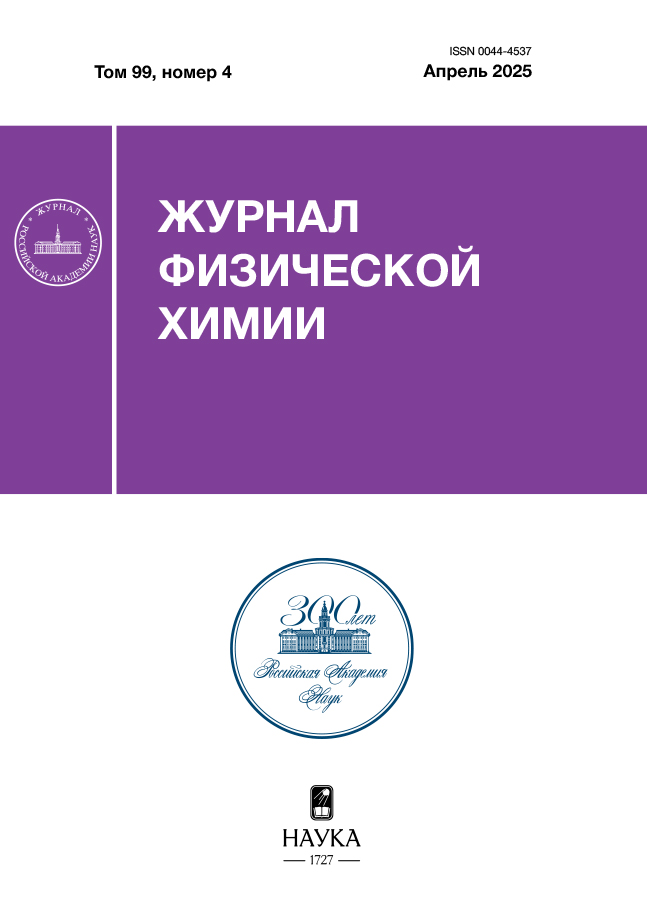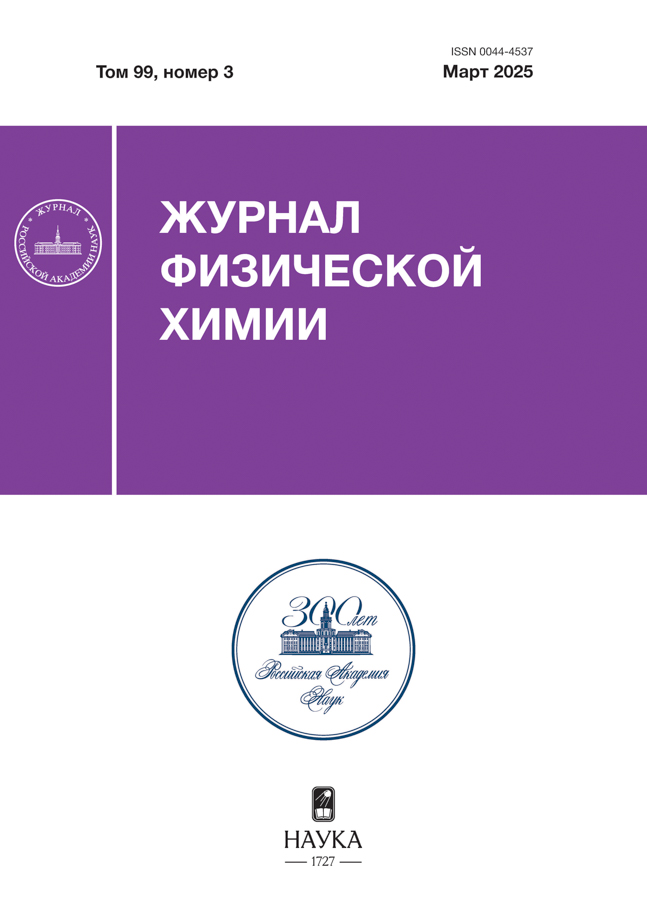Термодинамика сорбции и закономерности удерживания галогенадамантанов на циклодекстринсодержащем сорбенте cyclobond в условиях ВЭЖХ
- Авторы: Яшкин С.Н.1, Базилин А.В.1, Рыжихина Э.В.1, Светлов Д.А.2
-
Учреждения:
- Самарский государственный технический университет
- Испытательная лаборатория по Самарской области ФГБУ “ЦЛАТИ по ПФО”
- Выпуск: Том 99, № 3 (2025)
- Страницы: 450–458
- Раздел: ФИЗИЧЕСКАЯ ХИМИЯ ПРОЦЕССОВ РАЗДЕЛЕНИЯ. ХРОМАТОГРАФИЯ
- Статья получена: 03.06.2025
- Статья опубликована: 29.05.2025
- URL: https://permmedjournal.ru/0044-4537/article/view/682027
- DOI: https://doi.org/10.31857/S0044453725030102
- EDN: https://elibrary.ru/ECJDZP
- ID: 682027
Цитировать
Полный текст
Аннотация
Экспериментально в условиях ВЭЖХ впервые определены термодинамические характеристики сорбции (факторы удерживания, теплоты и энтропийные факторы сорбции) различных хлор-, бром- и иодадамантанов из водно-метанольного элюента на сорбентах октилсиликагеле (SiO2-C8) и β-ЦД-октилсиликагеле (CYCLOBOND). Установлено, что сорбция галогенадамантанов на указанных сорбентах имеет разный механизм: распределительный на SiO2-C8 и макроциклический на CYCLOBOND. Изомеры галогенадамантанов на исследованных сорбентах различаются порядком удерживания при одинаковых условиях элюирования. Показана высокая структурная селективность сорбента CYCLOBOND при разделении изомеров положения и стереоизомеров галогенадамантанов. Значения факторов разделения изомеров положения увеличиваются с ростом ван-дер-ваальсовых радиусов атомов галогенов. Высказана гипотеза о том, что галогенадамантаны, для которых образование внутрисферных комплексов с β-ЦД-фрагментами затруднительно, могут образовывать внешнесферные комплексы с экзоциклическими ОН-группами β-ЦД, реализуя механизм сорбции подобно варианту гидрофильной хроматографии.
Полный текст
Об авторах
С. Н. Яшкин
Самарский государственный технический университет
Автор, ответственный за переписку.
Email: snyashkin@mail.ru
Россия, 443100, Самара
А. В. Базилин
Самарский государственный технический университет
Email: snyashkin@mail.ru
Россия, 443100, Самара
Э. В. Рыжихина
Самарский государственный технический университет
Email: snyashkin@mail.ru
Россия, 443100, Самара
Д. А. Светлов
Испытательная лаборатория по Самарской области ФГБУ “ЦЛАТИ по ПФО”
Email: snyashkin@mail.ru
Россия, 443093, Самара
Список литературы
- Багрий Е.И. Адамантаны: получение, свойства, применение. М.: Наука, 1989. 264 с.
- Шокова Э.А., Ковалев В.В. // Журн. орган. химии. 2012. Т. 48. № 8. С. 1013. https://doi.org/10.1134/S1070428012080015
- Гируц М.В., Гордадзе Г.Н. Химия и геохимия углеводородов алмазоподобного строения. М.: Недра, 2017. 222 с.
- Морозов И.С., Петров В.И., Сергеева С.А. Фармакология адамантанов. Волгоград: Волгоградская медицинская академия, 2001. 320 с.
- Diamondoids: Synthesis, Properties, and Applications / Eds. S. Stauss, K. Terashima. Pan Stanford Publishing Pte. Ltd., 2017. 241 p.
- Solovova N.V., Yashkin S.N., Danilin A.A. // Russ. J. Phys. Chem. 2004. V. 78, Suppl. 1. S. 182.
- Яшкин С.Н., Агеева Ю.А. // Журн. физ. химии. 2014. Т. 88. № 4. С. 704. https://doi.org/10.1134/S0036024414040311
- Яшкин С.Н., Яшкина Е.А., Светлов Д.А. и др. // Изв. РАН. Сер. хим. 2013. Т. 62. № 5. С. 1287. https://doi.org/10.1007/s11172-013-0178-y
- Cserháti T. Cyclodextrins in chromatography. Cambridge: Royal Society of Chemistry, 2003. 157 p.
- Rüdiger V., Eliseev A., Simova S., et al. // J. Chem. Soc., Perkin Trans 2. 1996. № 10. С. 2119. https://doi.org/10.1039/P29960002119
- Voskuhl J., Waller M., Bandaru S., et al. // Org. Biomol. Chem. 2012. V. 10. № 23. С. 4524. https://doi.org/10.1039/C2OB06915F
- Kellett K., Kantonen S.A., Duggan B.M., et al. // J. Solution Chem. 2018. V. 47. № 10. С. 1597. https://doi.org/10.1007/s10953-018-0769-1
- Schönbeck C., Holm R. // J. Phys. Chem. B. 2019. V. 123. № 31. С. 6686. https://doi.org/10.1021/acs.jpcb.9b03393
- Яшкин С.Н., Агеева Ю.А. // Журн. физ. химии. 2013. Т. 87. № 11. С. 1953. https://doi.org/10.1134/S0036024413110241
- Базилин А.В., Яшкина Е.А., Яшкин С.Н. // Изв. РАН. Сер. хим. 2016. Т. 65. № 1. С. 103. https://doi.org/10.1007/s11172-016-1271-9
- Яшкин С.Н., Базилин А.В., Яшкина Е.А. // Журн. физ. химии. 2016. Т. 52. № 6. С. 593. https://doi.org/10.1134/S2070205116020325
- CYCLOBOND Handbook: A guide to using cyclodextrin bonded phases for chiral LC separations (sigmaaldrich.com).
- SUPELCOSIL™ LC-8 HPLC Column | Sigma-Aldrich (sigmaaldrich.com).
- Яшкин С.Н., Яшкина Е.А., Светлов Д.А. и др. // Изв. РАН. Сер. хим. 2020. Т. 69. № 5. С. 909. https://doi.org/10.1007/s11172-020-2848-x
- Шатц В.Д., Сахартова О.В. Высокоэффективная жидкостная хроматография: основы теории, методология, применение в лекарственной химии. Рига: Зинатне, 1988. С. 85.
- Kaliszan R. Quantitative Structure-Chromatographic Retention Relationships. New York: John Wiley & Sons, 1987. 303 p.
- Vailaya A., Horvath C. // J. Chromatogr. A. 1998. V. 829. № 1. P. 1. https://doi.org/10.1016/S0021-9673(98)00727-4
- Szejtli J. // Chem. Rev. 1998. V. 98. № 5. P. 1743. https://doi.org/ 10.1021/cr970022c
- Schuster G., Lindner W. // J. Chromatogr. A. 2013. V. 1301. № 1. P. 98. https://doi.org/10.1016/j.chroma.2013.05.065
- Vailaya A., Horvath C. // J. Phys. Chem. 1996. V. 100. № 6. С. 2447. https://doi.org/10.1021/jp952285l
Дополнительные файлы















